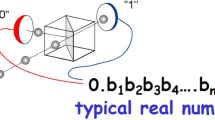Abstract
Classical and quantal physics are fundamentally different in the way that each deals with complexity. We examine both the algorithmic and the computational aspects of this difference. Any comprehensive deterministic theory must contain a certain ineffectiveness in producing long-term predictions of the future, whereas a probabilistic theory is not so handicapped. The relevance of these considerations to chaos is discussed.
Similar content being viewed by others
References
J. E. Littlewood,A Mathematician's Miscellany (Methuen, London, 1953).
G. Chaitin,Algorithmic Information Theory (Cambridge University Press, Cambridge, 1987).
J. Ford, “What is chaos that we should be mindful of it?” inThe New Physics, S. Capelin and P. Davis, eds. (Cambridge University, Press, Cambridge, 1987).
J. E. Hopcroft and J. D. Ullman,Formal Languages and Their Relation to Automata (Addison-Wesley, Massachusetts, 1969), Chap. 10.
R. Rucker,Mind Tools (Houghton Mifflin, Boston, 1987).
B. O. Koopman,Proc. Natl. Acad. Sci. USA 17, 315 (1931).
P. Benioff,J. Stat. Phys. 29, 515 (1982).
R. Feynman,Optics News 11, 11 (1985); reprinted inFound. Phys. 16, 507 (1986).
D. Deutsch,Proc. R. Soc. Lond. A 400, 97 (1985).
M. Henon and C. Heiles,Astron. J. 69, 73 (1964).
Y. G. Sinai,Russ. Math. Surv. 25(2), 137 (1970).
M. V. Berry,Ann. Phys. 131, 163 (1981).
S. Wolfram,Phys. Rev. Lett. 54, 735 (1985).
E. B. Baun,Phys. Rev. Lett. 57, 2764 (1986).
S. Kirkpatrick, C. D. Gelatt, Jr., and M. P. Vecchi,Science 220, 671 (1983).
M. C. Gutzwiller,Physica D 7, 341 (1983).
J. Bekenstein,Phys. Rev. D 30, 1669 (1984).
Y. Aharonov and M. Vardi,Phys. Rev. D 21, 2235 (1980).
D. Anosov,Proc. Steklov Inst. Math. 90 (1967).
R. Bowen,J. Diff. Eqs. 18, 333 (1975).
W. E. Lamb, Jr., “Quantum chaos and the theory of measurement,” inChaotic Behaviro in Quantum Systems, G. Casati, ed. (Plenum, New York, 1985).
M. V. Berry and M. Tabor,Proc. R. Soc. Lond. A 356, 375 (1977).
M. V. Berry, N. L. Balazs, M. Tabor, and A. Voros,Ann. Phys. (N.Y.) 122, 26 (1979).
I. C. Percival,J. Phys. B 6, 1229 (1973).
A. Peres,Phys. Rev. A 30, 1610 (1984).
W. E. Lamb, Jr., “Theory of quantum mechanical measurements,” preprint, 1986.
C. M. Caves,Phys. Rev. D 33, 1643 (1986).
G. J. Milburn and C. A. Holmes,Phys. Rev. Lett. 56, 2237 (1986).
G. J. Milburn,Phys. Rev. A 33, 674 (1986).
A. Peres, “Quantum chaos and the measurement problem,”Proceedings 1986 Como Conference, E. R. Pike and S. Sarkar, eds. (Pkenum, New York, 1987), p. 59.
R. Landauer,Phys. Rev. Lett. (Comments)58, 2150 (1987).
J. M. Blatt,Prog. Theor. Phys. 22, 745 (1959).
H. D. Zeh,Found. Phys. 1, 69 (1970).
L. D. Landau and E. M. Lifshitz,Statistical Physics (Pergamon, London, 1958).
R. Jencel,Foundations of Classical and Quantum Statistical Mechanics (Pergamon, London, 1969).
N. S. Krylov,Works on the Foundations of Statistical Physics (Princeton University Press, Princeton, 1979).
N. G. van Kampen,Physica 20, 603 (1954).
G. Chaitin,Int. J. Theor. Phys. 21, 941 (1982); reprinted inNew Directions in the Philosophy of Mathematics, T. Tymoczko, ed. (Birkhäuser, Boston, 1986).
A. Peres and W. H. Zurek,Am. J. Phys. 50, 807 (1982).
J. Rothstein,Int. J. Theor. Phys. 21, 327 (1982).
N. G. van Kampen, “A model for quantum-mechanical measurement,”Proceedings, 1986 Como Conference, E. R. Pike and S. Sarkar, eds. (Plenum, New York, 1987), p. 215.
M. C. Gutzwiller,Physica D 5 183 (1982).
G. Casati, B. V. Chirikov, I. Guaneri, and D. L. Shepelyansky,Phys. Rev. Lett. 57, 823 (1986).
J. Ford,Nature 325, 19 (1987).
E. Joos and H. D. Zeh,Z. Phys. B 59, 223 (1985).
N. F. Mott,Proc. R. Soc. Lond, A 126, 79 (1929); reprinted inQuantum Theory of Measurement, J. A. Wheeler and W. H. Zurek, eds. (Princton University Press, Princeton, 1982).
C. H. Woo, UCRL (Berkeley) Report 10431, 1962.
H. Stein,Nous 18, 635 (1984).
J. B. Hartle, 1986 Cargese Lecture, “Gravitation in Astrophysics,” B. Carter and J. B. Hartle, eds. (Plenum, NY, 1987).
Author information
Authors and Affiliations
Rights and permissions
About this article
Cite this article
Woo, C.H. Chaos, ineffectiveness, and the contrast between classical and quantal physics. Found Phys 19, 57–76 (1989). https://doi.org/10.1007/BF00737766
Received:
Revised:
Issue Date:
DOI: https://doi.org/10.1007/BF00737766




